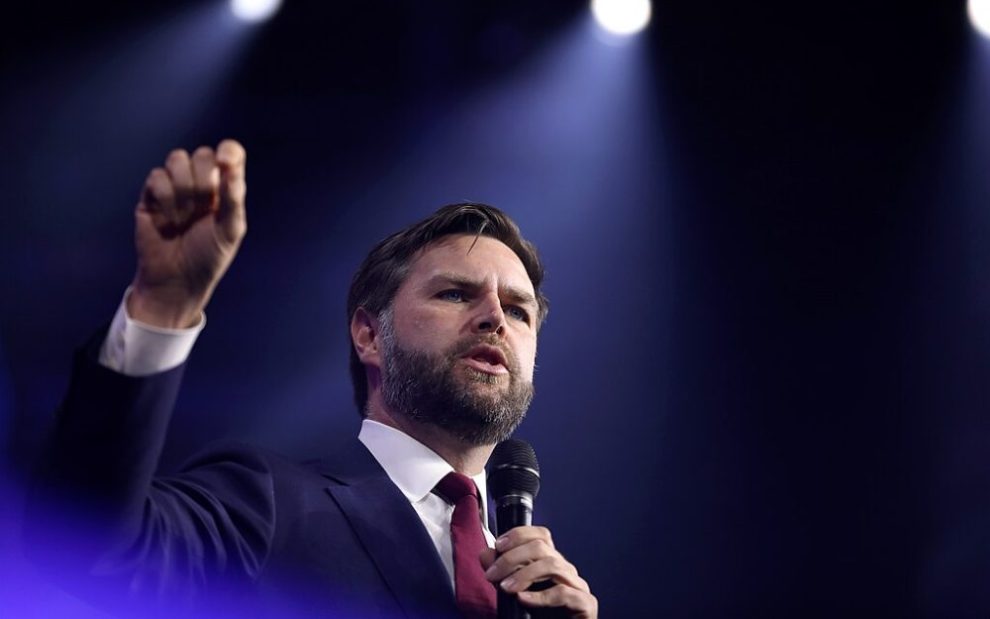Donald Trump has chosen Ohio senator J.D. Vance to be his running mate in the 2024 election. Like Trump, Vance is a self-proclaimed populist who says he will put America first, and who has criticized sending aid to Ukraine. Strongly anti-immigrant, he recently called for mass deportations. Trump stated in his Truth Social announcement that Vance “will be strongly focused on the people he fought so brilliantly for, the American Workers and Farmers in Pennsylvania, Michigan, Wisconsin, Ohio, Minnesota, and far beyond.” He seems to hope that the author of Hillbilly Elegy will help shore up his white working-class base in midwestern and rust belt regions, despite the fact Vance, in his book, blames the white working class for their own problems.
Vance recently converted to Catholicism, and this could be another key reason why he was picked. When the most recently proposed GOP platform did not name abortion as a priority, a number of Catholics on X, formerly Twitter, were upset. Trump and others in Republican leadership appear to be softening their position on abortion—perhaps because, since the repeal of Roe, voters keep rejecting further statewide restrictions on abortion. But this could lead to less enthusiasm for Trump on the part of right-wing traditionalist Catholics.
Vance’s Catholic affiliations are very much in the public eye. In 2022, during his senate race, he spoke at the ultra-conservative Franciscan University of Steubenville, as part of a conference associated with Catholic integralism. He has criticized the practice of no-fault divorce and speaks fondly of the “traditional family.” Is this pick a signal from Trump to the disgruntled pro-life faithful that they have not been forgotten?
Vance, like many other high-profile conservatives, has pivoted from being fiercely critical of Trump. Now he will be expected to repeat the usual MAGA slogans while also brandishing his Catholic and anti-abortion credentials on the campaign trail throughout the Midwest. But there’s more to Catholic teaching than opposition to abortion. Looking at Vance’s record, how well do his views align with core Catholic teachings on faith and morals?
As a right-wing populist who embraces an “America First” viewpoint, Vance is in opposition to the Catholic tradition of viewing all people as God’s children, putting no one nation or people over others. Pope Francis has spoken out against right-wing populism, since it tends to erode the common good and pit different marginalized groups against one another.
Vance’s anti-immigration stance is in direct opposition to traditional Catholic teaching, rooted in both Hebrew scriptures and early Christian writings. The first principle of the church’s teaching on immigration, articulated by the United States Conference of Catholic Bishops (USCCB), is that people “have the right to migrate to sustain their lives and the lives of their families.” Seeking asylum is a basic human right, and Pope Francis has made immigration a hallmark of his papacy, bringing refugee families to live at the Vatican and visited Lampedusa, a destination for many seeking refuge as they cross the Mediterranean.
Vance’s rhetoric about the importance of families sounds Catholic, on the surface. The church has long emphasized the importance of maintaining strong families as part of the social order. But his remarks about family life should be weighed in light of his suggestion that women should stay in abusive marriages for the sake of the children.
Even Vance’s anti-abortion views should come into question as he recently stated that he is in favor of the abortion pill mifepristone “being accessible.”
On economic issues, Vance has supported some conservative fiscal policies, including aggressive tax cuts for the rich. But he has also favored some restrictions on large corporations, citing concerns about a “global oligarchy.” Here, Vance is more closely aligned with Catholic social teaching, which favors taxation to counter income inequality and assist those in need. The USCCB’s document Economic Justice for All states that “the tax system should raise adequate revenues to pay for the public needs of society, especially to meet the basic needs of the poor” and that “the tax system should be structured according to the principle of progressivity, so that those with relatively greater financial resources pay a higher rate of taxation.”
When it comes to environmental issues, Vance is strongly in favor of the oil and gas industry, despite concerns about ecological degradation and the impact on the poor and working classes in rural Appalachian regions. He has also done an about-face on climate change, now embracing Trump’s climate science denial, in direct opposition to Pope Francis’ repeated pleas for climate justice in documents such as Laudato Si’ and Fratelli Tutti.
Clearly, Vance has some work to do if he is going to tout his Catholic credentials. The bishops and various Catholic thought leaders have spoken out against the pro-choice views of Joe Biden and Nancy Pelosi—both prominent Catholic politicians—but Vance’s anti-immigrant views place him in a position of dissent from core moral and social teachings going back to the foundations of Christianity. And non-Catholics as well as Catholics should be concerned about Vance’s alignment with an ideology that Pope Francis has called a threat to democracy.
Catholic voters in the United States are accustomed to hearing criticisms of liberal and progressive politicians who sometimes support policies that are not in line with church teachings. But even if Catholics don’t hear the same kind of warnings about Vance’s views, it’s still important to assess them in light of the church’s teachings, and not just on abortion. Catholic morality encompasses an array of interlocking issues, and, as Pope Francis has reiterated repeatedly, immigration, care for the environment, and the responsibility to meet the needs of the poor and marginalized are urgent and serious concerns.
Image: Wikimedia Commons/Gage Skidmore (CC BY-SA 2.0)















Add comment